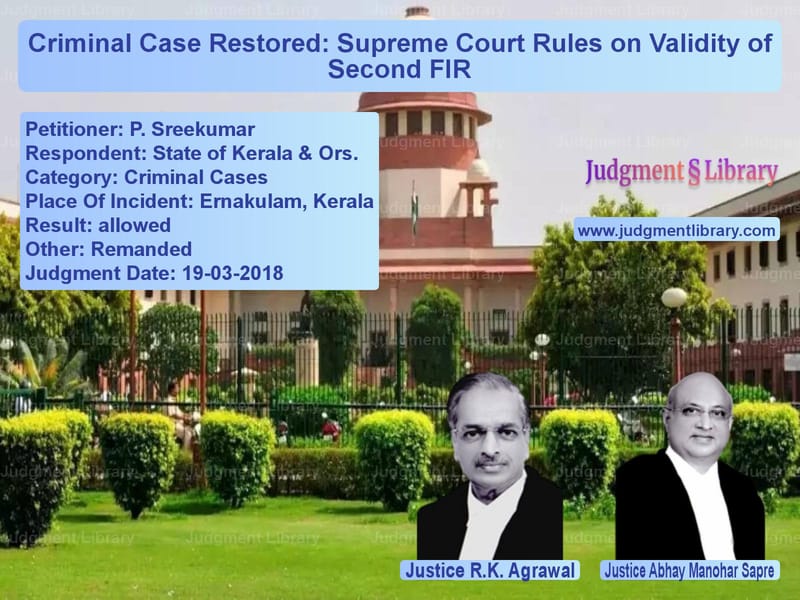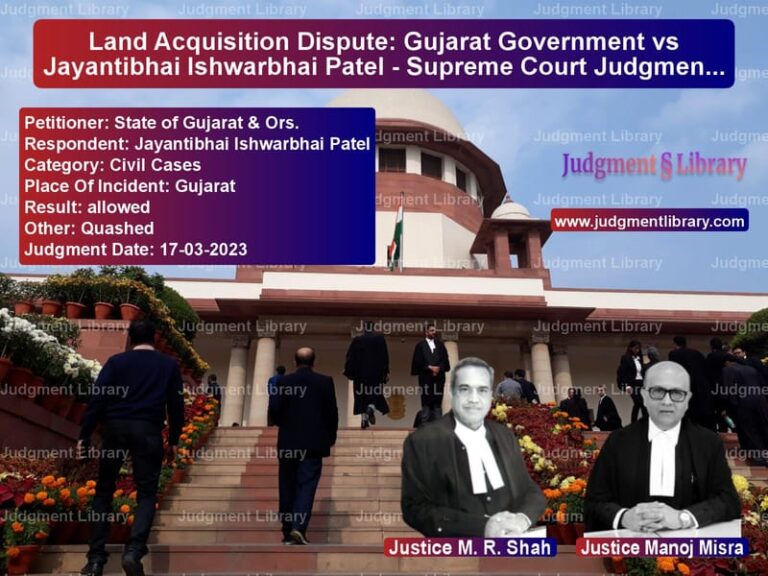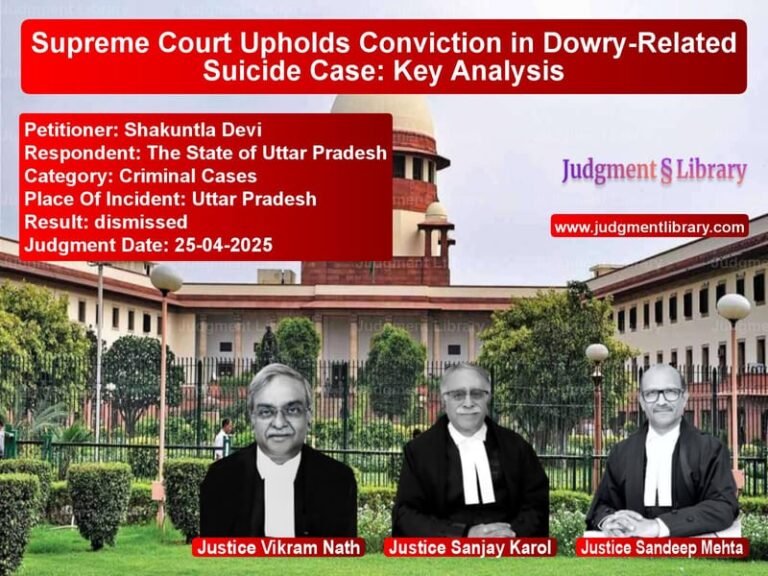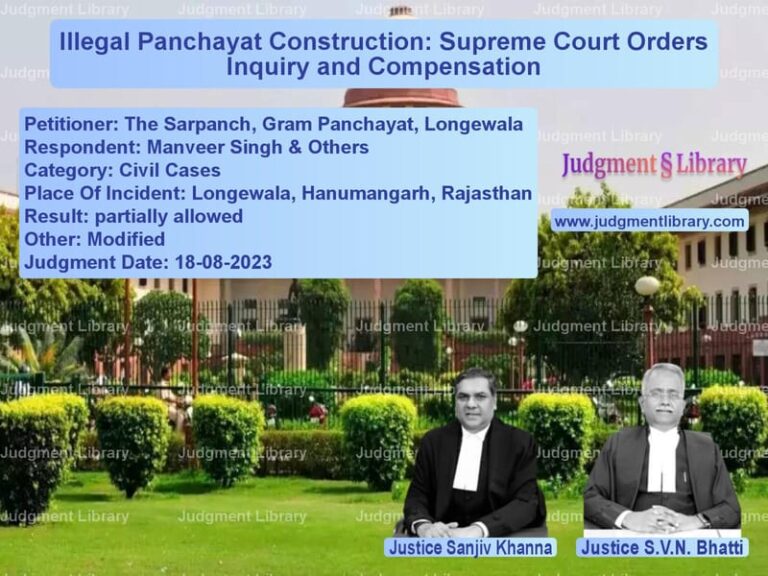Criminal Case Restored: Supreme Court Rules on Validity of Second FIR
The Supreme Court of India, in P. Sreekumar v. State of Kerala & Ors., addressed a significant legal question regarding the validity of filing a second FIR on the same incident but with a different version of events. The case revolved around allegations of financial fraud and forgery within a public charitable trust and whether the second FIR should be quashed.
Background of the Case
The case arose from a financial dispute within the Vidyodaya Trust, a public charitable trust engaged in educational activities in Kerala. The appellant, P. Sreekumar, was one of the Chief Executive Trustees, while Respondent No. 2 was another trustee, and Respondent No. 3 was the Treasurer at the relevant time.
The dispute began when Respondent No. 2 filed a private complaint alleging misappropriation of trust funds. Subsequently, two separate FIRs were registered:
- Crime Case No. 817 of 2001: Filed against the appellant, Respondent No. 3, and three bank officials under Sections 408, 409, 420, 467, 468, 473, and 477 of the IPC for financial fraud and forgery.
- Crime Case No. 5 of 2002: Filed by the appellant against Respondent No. 3 under Sections 406, 409, 465, 467, and 471 of the IPC, alleging misappropriation of funds by the Treasurer.
Following an investigation, the police submitted a final report in Crime Case No. 817 of 2001, discharging the appellant and three bank officials from the case while maintaining charges against Respondent No. 3.
Legal Issues Before the Supreme Court
- Whether the second FIR (Crime Case No. 5 of 2002) was legally maintainable.
- Whether the High Court erred in quashing the second FIR and charge sheet.
- Whether a counter-complaint on the same incident is permissible in law.
Arguments of the Parties
Petitioner’s (P. Sreekumar’s) Arguments
- The second FIR was a counter-complaint arising from the same incident, which is legally permissible.
- The High Court failed to consider that the allegations in both FIRs were distinct and needed independent investigation.
- Quashing the FIR without trial denied the petitioner an opportunity to prove financial misappropriation by Respondent No. 3.
Respondent’s (State of Kerala & Ors.) Arguments
- Two FIRs on the same incident cannot be maintained, and the second FIR should be quashed.
- The first FIR (Crime Case No. 817 of 2001) already covered all allegations, and the second FIR was an attempt to complicate the proceedings.
- The High Court correctly applied the principles laid down in State of Haryana v. Bhajan Lal and T.T. Antony v. State of Kerala, which prohibit multiple FIRs on the same incident.
Supreme Court’s Analysis and Judgment
The Supreme Court bench, comprising Justice R.K. Agrawal and Justice Abhay Manohar Sapre, examined the legal principles governing multiple FIRs and counter-complaints.
1. Validity of a Second FIR
The Court emphasized that while multiple FIRs on the same incident by the same complainant are not allowed, a counter-complaint providing a different version of events is permissible. It ruled:
“A counter-complaint arising out of the same incident but providing a different version of the facts is legally maintainable.”
2. High Court’s Error in Quashing the FIR
The Supreme Court criticized the High Court for failing to distinguish between duplicate FIRs and counter-complaints. It observed:
“The High Court committed a jurisdictional error in quashing the second FIR without analyzing the factual distinctions between the two cases.”
3. Judicial Precedents on Multiple FIRs
The Court referred to the three-judge bench ruling in Upkar Singh v. Ved Prakash, which clarified that rival versions of the same incident can lead to separate FIRs. It ruled:
“Lodging of a counter-FIR relating to the same or connected cognizable offense is permissible in law.”
Final Judgment
The Supreme Court ruled in favor of the appellant and issued the following directives:
- The High Court’s order quashing the second FIR was set aside.
- Crime Case No. 5 of 2002 was restored for trial before the Magistrate.
- The trial court was directed to complete the case within one year.
Impact of the Judgment
This ruling has significant implications for criminal law in India:
- Clarification on Counter-Complaints: The judgment establishes that counter-complaints providing a different version of events can lead to a valid FIR.
- Judicial Scrutiny of FIR Quashing: High Courts must carefully examine the nature of complaints before quashing FIRs.
- Speedy Disposal of Criminal Cases: The Supreme Court’s directive ensures that counter-complaints are not delayed indefinitely.
Conclusion
The Supreme Court’s ruling in P. Sreekumar v. State of Kerala & Ors. upholds the legal validity of counter-complaints and prevents wrongful quashing of FIRs at the preliminary stage. By restoring the case for trial, the Court reinforced the principle that different versions of the same incident deserve independent judicial scrutiny.
Petitioner Name: P. SreekumarRespondent Name: State of Kerala & Ors.Judgment By: Justice R.K. Agrawal, Justice Abhay Manohar SaprePlace Of Incident: Ernakulam, KeralaJudgment Date: 19-03-2018
Don’t miss out on the full details! Download the complete judgment in PDF format below and gain valuable insights instantly!
Download Judgment: P. Sreekumar vs State of Kerala & Or Supreme Court of India Judgment Dated 19-03-2018.pdf
Direct Downlaod Judgment: Direct downlaod this Judgment
See all petitions in Fraud and Forgery
See all petitions in Bail and Anticipatory Bail
See all petitions in Legal Malpractice
See all petitions in Judgment by R K Agrawal
See all petitions in Judgment by Abhay Manohar Sapre
See all petitions in allowed
See all petitions in Remanded
See all petitions in supreme court of India judgments March 2018
See all petitions in 2018 judgments
See all posts in Criminal Cases Category
See all allowed petitions in Criminal Cases Category
See all Dismissed petitions in Criminal Cases Category
See all partially allowed petitions in Criminal Cases Category







